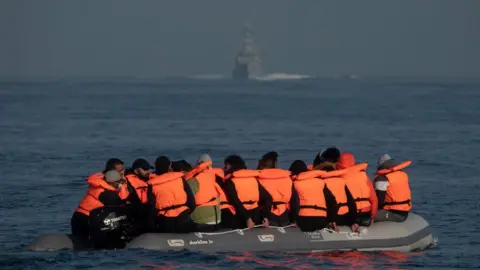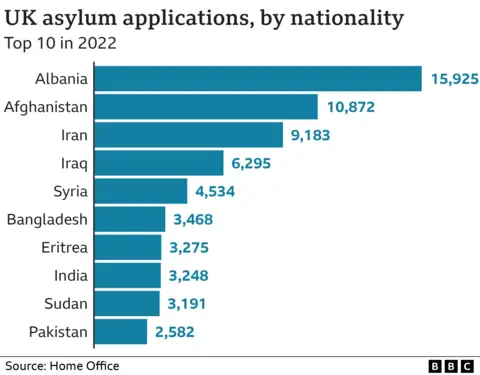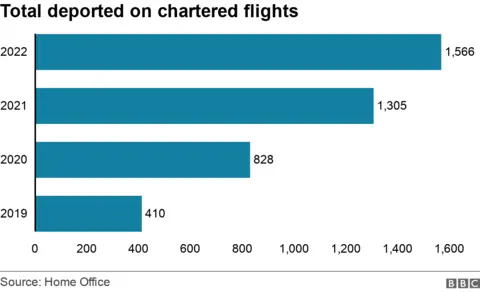Plan for lifetime ban for Channel migrants is unworkable, say charities
 Dan Kitwood/Getty Images
Dan Kitwood/Getty ImagesGovernment plans to ban migrants from re-entering the UK if they cross the Channel in small boats are unworkable and will leave thousands of people in limbo, refugee groups have said.
Under new legislation, Channel migrants would be removed from the UK, banned from future re-entry and barred from applying for British citizenship.
Supporters say the PM is "getting a grip" on illegal migration.
The government is expected to outline the plans on Tuesday.
The proposed measures will apply to anyone arriving on UK shores in a small boat - but there are few details on how they will be implemented, with previous efforts to tighten procedures - such as the Rwanda policy - mired in legal challenges.
PM Rishi Sunak, who has made the issue one of his top priorities, told the Mail on Sunday: "Make no mistake, if you come here illegally, you will not be able to stay."
But the Refugee Council, one of a number of charities to criticise the plans, accused ministers of shattering the UK's long-standing commitment under the UN Convention to give people a fair hearing, regardless of how they get to the UK.
The group's head Enver Solomon said the plans would "add more cost and chaos to the system", adding: "It's unworkable, costly and won't stop the boats".
It is thought the legislation would place a duty on the home secretary to remove all those arriving on boats to Rwanda or a "safe" third country "as soon as reasonably practicable" - no matter where they had come from - and would also permanently ban them from returning.
Currently, asylum seekers arriving in the UK have the right to seek protection under the UN's Refugee Convention and the European Convention on Human Rights.
But the Mail on Sunday says a clause in the Illegal Migration Bill is expected to apply a "rights brake" to effectively allow the conventions to be circumvented. It is not clear how this would work.
The proposed legislation would also stop those coming to the UK in small boats from applying for British citizenship.
Under current UK law, a person can seek to settle permanently and apply for citizenship after five years in the country - but this is not straightforward.
Last year's immigration act already gave the home secretary the power to bar Channel migrants from seeking to resettle. It is possible the new plans might be aiming to make this an automatic ban and not a discretionary one.

Downing Street said the government would eventually open up more safe routes for asylum claims, but only "once we have control over our borders".
While declining to give a timeline, Mr Sunak's official spokesman said rising numbers of Channel crossings meant "there is no time to waste" on implementing the new plans.
But Labour's Wes Streeting called the measures "the latest in a long line for unworkable gimmicks" and predicted they would not "see the light of day" or get through Parliament.
The shadow health secretary said the government should instead create better safe routes into the country, speed up the processing of asylum claims and direct money into the National Crime Agency to arrest criminal gangs trafficking people.
More than 100 people in three boats were brought to shore by Border Force and the RNLI in Dover on Monday.
Legal challenges
Despite a deal being reached last year, not one migrant has been sent to Rwanda yet and any plans to do so are currently on hold after the policy was met with fierce opposition and legal interventions.
In December, the High Court ruled the scheme did not breach the UN's Refugee Convention. But that decision is facing further challenges in the courts, with a preliminary hearing expected on Monday at the Court of Appeal.
There is no agreement in place on the return of migrants with the EU.
The home secretary - who will introduce the new laws - told the Sun on Sunday "the only route to the UK will be a safe and legal route".
The Home Office says there are a number of these routes to the UK.
However, some are only available to people from specific countries, such as Afghanistan and Ukraine, or for British National status holders in Hong Kong.
Other asylum routes accept a limited number of refugees according to precise criteria.

Meanwhile, figures obtained by the BBC show that Home Office charter flights to forcibly remove illegal immigrants from the UK cost more per seat than a first class ticket to New York.
The government spent £12.7m last year on the flights - removing 1,500 people - a Freedom of Information request by BBC News has revealed.
A quarter of the flights took off with 20 or fewer passengers on board, including two flights with less than 10.
Of the 62 flights chartered by the Home Office in 2022, the data shows the flights worked out at an average of £205,000.

What are the current rules for claiming UK asylum?
By Tom Edgington, BBC Reality Check
It is already illegal for migrants to knowingly enter the UK without a visa or special permission.
The rule, part of last year's Nationality and Borders Act, means people who illegally arrive in the UK can be jailed for up to four years and removed to a safe country. However, very small numbers are likely to be prosecuted.
That's because the UK has an international legal obligation not to criminally penalise anyone who seeks protection as a refugee.
The government says "safe and legal" routes for those seeking UK asylum already exist. However, most are only available to people from specific countries - like Afghanistan and Ukraine.

Elsewhere, others have criticised the new plans with the Lib Dems calling them "immoral, ineffective and incredibly costly for taxpayers while doing nothing to stop small boat crossings".
Freedom from Torture, a charity which provides therapy to asylum seekers, described the measures as "vindictive and dysfunctional".
And Amnesty International called them "disgraceful posturing and scaremongering".
The government has previously said the Rwanda plan would discourage others from crossing the English Channel but so far there is no evidence that has happened.
In 2022, 45,756 migrants crossed the English Channel to Britain in small boats, according to government figures collated by the BBC.
That is the highest number since the first records in 2018.
Latest Home Office figures show 2,953 migrants have crossed the Channel using this method already this year, originating from a range of countries including Albania, Iran, Iraq, Afghanistan and Syria.